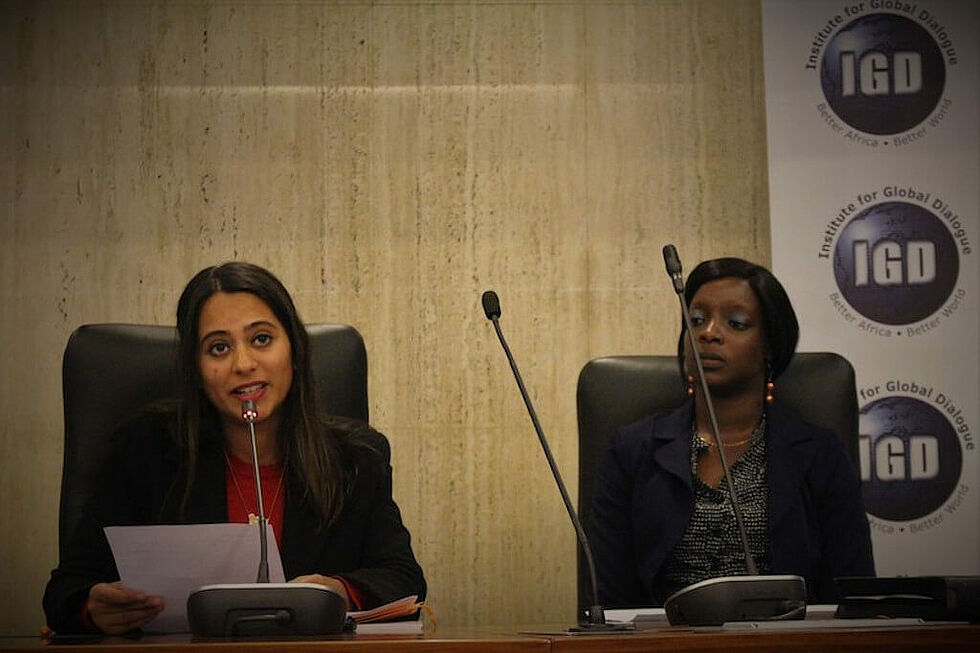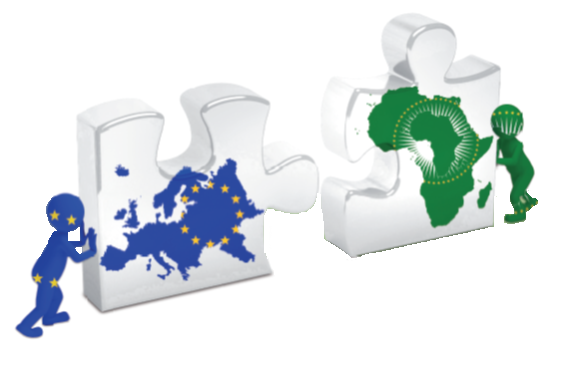High time for a common African policy on China
Significant investments by China in Africa have extended the country’s economic ties on the continent. In 2009, China’s trade with Africa overtook that of the United States to become the continent’s largest single trade partner (paywall).
While China released its first policy positions towards Africa as early as 2006, Africa remains without a common policy on China’s business practices and relationship with the continent.
A report with recommendations for a pan-African policy and strategy to guide Africa’s engagement with China was published this October by the South Africa-based think-tank Institute for Global Dialogue (IGD). The report summarizes the proceedings from a symposium organized by IGD, Friedrich Ebert Stiftung (FES) in South Africa and the Wits Africa-China Reporting Project (ACRP) in July 2017.
At the start of talks in Abidjan (Cote D’Ivore) intended to deepen the strategic partnership between Africa and the European Union, FES met with Dr Philani Mthembu, the current executive director of the IGD in Pretoria, partners of FES since the very founding of IGD in 1995. Together we spoke about the prospects, politics and challenges facing an African common policy on China.
What perceptions of China are predominant on the African continent? Some are critical over its business practices, and the failure to promote good governance and human rights, while others are content with China’s policy of non-interference.
Philani Mthembu: Instead of recycling polarized pro and anti-China sentiments, the only way for a more balanced discussion to emerge is if Africans themselves, understanding their own priorities and interests, study and interpret China’s role using empirically grounded research. Such a process will allow the plurality of African voices on China and other external actors in Africa to come out more clearly.
Like in other parts of the world, Africans are interested in China’s recent rapid development, and this should not come as a surprise given that Africa is home to the largest number of developing countries in the world with a youthful population tired of rhetoric, and more interested in the implementation of the various national, regional, and continental development plans. When many Africans see the results in China, they see that it is indeed possible for a country to move in a relatively short amount of time from widespread poverty to relative prosperity using endogenous models of development.
Does Africa need a united pan-African approach towards China? Given the continent’s diversities, will individual African countries’ development priorities and needs not be most adequately addressed bilaterally?
PM: The call for common approaches and better coordination is not only focused on China, but on Africa’s international partnerships with external powers in general. These calls are captured in the Kagame Report on the institutional reform of the African Union (AU). The report calls for a change to the current approach, where a single external power engages at “Africa” summits” with individual heads of states taken to speak for the whole continent.
Calls for a common position do not necessarily advocate for a replacement of bilateral relations with external powers, but recognize the need for closer coordination amongst important African state actors, regional economic communities and the AU in shaping their international relations towards Africa’s development priorities.
When envisioning the various Africa summits, one must always keep in mind the size and diversity of the African continent. Indeed, the continent is large enough to fit the US, China, India, Portugal, Spain, Belgium, Netherlands, France, Germany, Switzerland, Italy, Eastern Europe, the UK, and Japan. It also comprises approximately 2,000 languages and cultures. Common positions, such as that of Africa on the sustainable development goals (SDGs) adopted by the UN to end poverty by 2030, do not ignore this diversity; instead, they aim to enhance the idea of continental sovereignty, which then feeds into greater individual agency on the part of African nation states and their various sub-regions.
Most regions that have achieved relative prosperity have displayed higher levels of trade and interaction amongst their various actors, making those regions less vulnerable to external crises. However, the levels of intra-Africa trade remain very low in comparison to other regions of the world, and this does not bode well for the continent.
Thus, while the calls for a common position do not necessarily advocate for a replacement of bilateral relations with external powers, they do recognize the need for closer coordination amongst important African state actors, regional economic communities and the AU in shaping their international relations towards Africa’s development priorities.
China is Africa’s largest trade partner. How can the African continent regain more ownership in the cooperation with China in order to shape its own narratives and put forward its countries’ interests?
PM: The issue of gaining ownership is not unique to Africa, now that China has managed to move up the rankings to be the second largest economy in the world. Even the US is increasingly uneasy with its trade deficit with China as it adopts a more nationalist approach. Because China has not put conditionality forward, apart from an adherence to the One China Policy, it is also arguable that African countries have been able to gain some policy space in their engagements with China, as they diversify their international partnerships.
Africans have not been able to maintain a coherent narrative towards the world, leading to African stories still largely being told by non-Africans. The recent Africa rising narrative does however give a framework and platform for African accounts to emerge, even though it has lost some of its momentum in recent years.
The infrastructure projects across the continent cannot solely be attributed to China’s own grand designs, but also to African demands for infrastructure development on the continent. This is also seen in the fact that growing calls for investments in Africa’s own manufacturing sectors have been answered by commitments from the Chinese side through the Forum on China Africa Cooperation (FOCAC) and other platforms. However, Africans have not been able to maintain a coherent narrative towards the world, leading to African stories still largely being told by non-Africans. The recent Africa rising narrative does however give a framework and platform for African accounts to emerge, even though it has lost some of its momentum in recent years.
What policy fields deserve more attention in the cooperation with China to adequately address African priorities of development?
PM: African policy makers and practitioners need to ensure that a significant amount of the projects identified at Africa summits have a regional impact, enhancing regional integration and connectivity in Africa. Moving beyond trade, the partnership with China must also focus more on extracting real value locally from Africa’s natural resources and encourage more local manufacturing, which will create more opportunities for the employment of Africa’s youth. Given that by 2050, Africa’s population is expected to double to over 2 billion, it will indeed be important to create new industries across the continent, supported by enhanced relations with Africa’s key partners such as China. ###
Philani Mthembu, the executive director of the Institute for Global Dialogue in Pretoria, holds a joint doctoral degree from the Freie Universität and Renmin University, which he pursued after graduating from international relations at the University of the Witwatersrand in Johannesburg.
For more information on the work by Friedrich-Ebert-Stiftung and partners on a common African policy on China, contact the FES South Africa team.
About FES Connect
Connecting people, in the spirit of social democracy, we source and share content in English from the German and international network of the Friedrich-Ebert-Stiftung.



